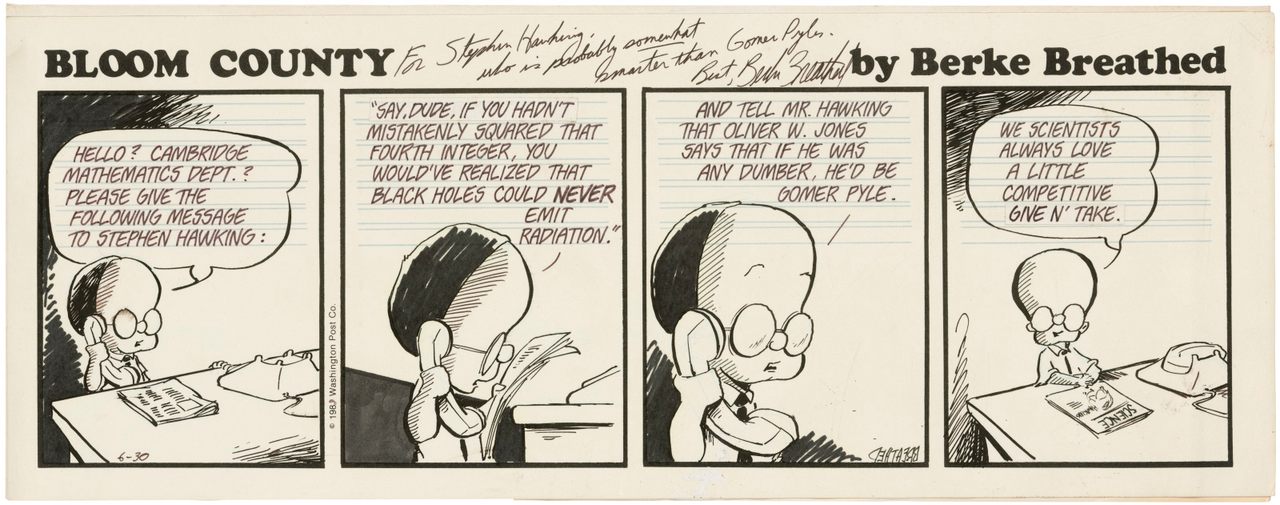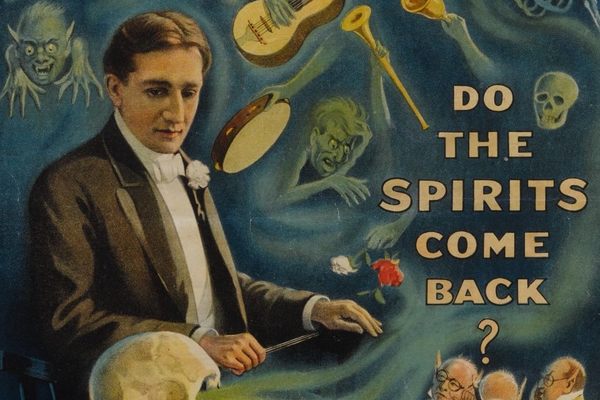For Sale: Proof That Legendary Scientists Were Real People, Too
Letters and trinkets show off the personal sides of Einstein, Hawking, and Schrödinger.
There’s a tendency to think of scientists as emotionally distant—two left brains for the price of a right. Ironically, the more iconic the scientist, the more we ought to know about them, the more that image tends to calcify: Think of it as the Genius Industry™.
A forthcoming online sale by Christie’s auction house, however, offers a slew of items that show off famous scientists’ more personal sides. Though the sale, called “Eureka! Scientific breakthroughs of the 20th century,” is full of patents, proofs, and papers, you’re just as likely to find intimate exchanges, inside jokes, and political musings. Bidding is live, and will wrap up on July 16, 2020.
Albert Einstein, as ever, provides a good place to start. One striking lot is a letter the physicist wrote, in 1929, to Herman Bernstein, who had chaired the Einstein Jubilee Committee and thrown the scientist’s 50th birthday party, at New York’s Metropolitan Opera House. Though Christie’s says that Einstein was “arguably the most famous individual in the world” at that time, it’s not clear whether he enjoyed that status. “I have to admit to you frankly,” he wrote, “that … I do not consider such an extreme cult of personality to be a good thing.” He described himself as an “unworthy person” for such a grand celebration. The letter also provides some insight into Einstein’s political activity, with the scientist suggesting that his celebrity status had been helpful in promoting the cause of Zionism.

In a more intimate Einstein letter, written a few years later in 1932, he wrote to his son Eduard, hoping to comfort him in the midst of treatment for schizophrenia. Einstein wrote of a friend who had suffered from depression, but had emerged “in cheerful spirits and the best of health.” Somewhat cheekily, the famous scientist also told Eduard not to worry about the contents of his father’s will: “I will never mention them again,” he wrote. The letter takes on an extra poignance in the context of Einstein’s biography. Though he mentioned his upcoming five-month appointment at Princeton, he didn’t know at the time that he’d be leaving Germany for good. Hitler took power the following year, and Einstein never saw Eduard again.
Politics and the course of history, in fact, loom large over the collection of items offered in the sale. In a 1927 letter, Erwin Schrödinger—he of simultaneously living-and-dead cat fame—digresses from scientific matters to throw some shade at Mussolini. Explaining why he declined an invitation to Italy’s Lake Como, Schrödinger wrote, “One would certainly hear things that one would not like. I do not like to assist people,” he added, “in celebrating their great men.” To Schrödinger, the loquacious Mussolini’s appeal could best be summarized by the medieval German poet Walther von der Vogelweide: “We prize poetry,” he quoted, “even if it is only mediocre.”

The auction also shows off Stephen Hawking’s sense of humor, something that’s charmed us since Hawking threw a cocktail party for time travelers. (He was the only one who showed up.) Up for auction is the original artwork of a 1988 Bloom County comic strip, inscribed to Hawking by the author and artist Berkeley Breathed. In the strip, the child-genius character Oliver Wendell Jones leaves a message for Hawking: “Say, dude, if you hadn’t mistakenly squared that fourth integer, you would’ve realized that black holes could never emit radiation.” Hawking, apparently, was a fan.
And according to the physicist himself, he gained no shortage of fans from his appearances on The Simpsons: four episodes in total, which apparently led some to believe that he was a fictional character created by the show. Hawking felt, as Christie’s puts it, that The Simpsons was “the best thing on American television,” and he held on to his own personal figurine from the show. It comes straight from Hawking’s personal estate. At press time, bidding exceeded $1,000.
All told, there’s a lot in the auction to make one laugh or maybe just reflect, but there’s at least one bit of genuine scientific instruction as well. In a 1921 letter to another Herr Einstein, Albert thanked his smoking companion for sharing an “elegant little pipe,” and advanced yet another theory. “One must cultivate the little vices,” he wrote, “so as not to give space to the big ones.”


























Follow us on Twitter to get the latest on the world's hidden wonders.
Like us on Facebook to get the latest on the world's hidden wonders.
Follow us on Twitter Like us on Facebook